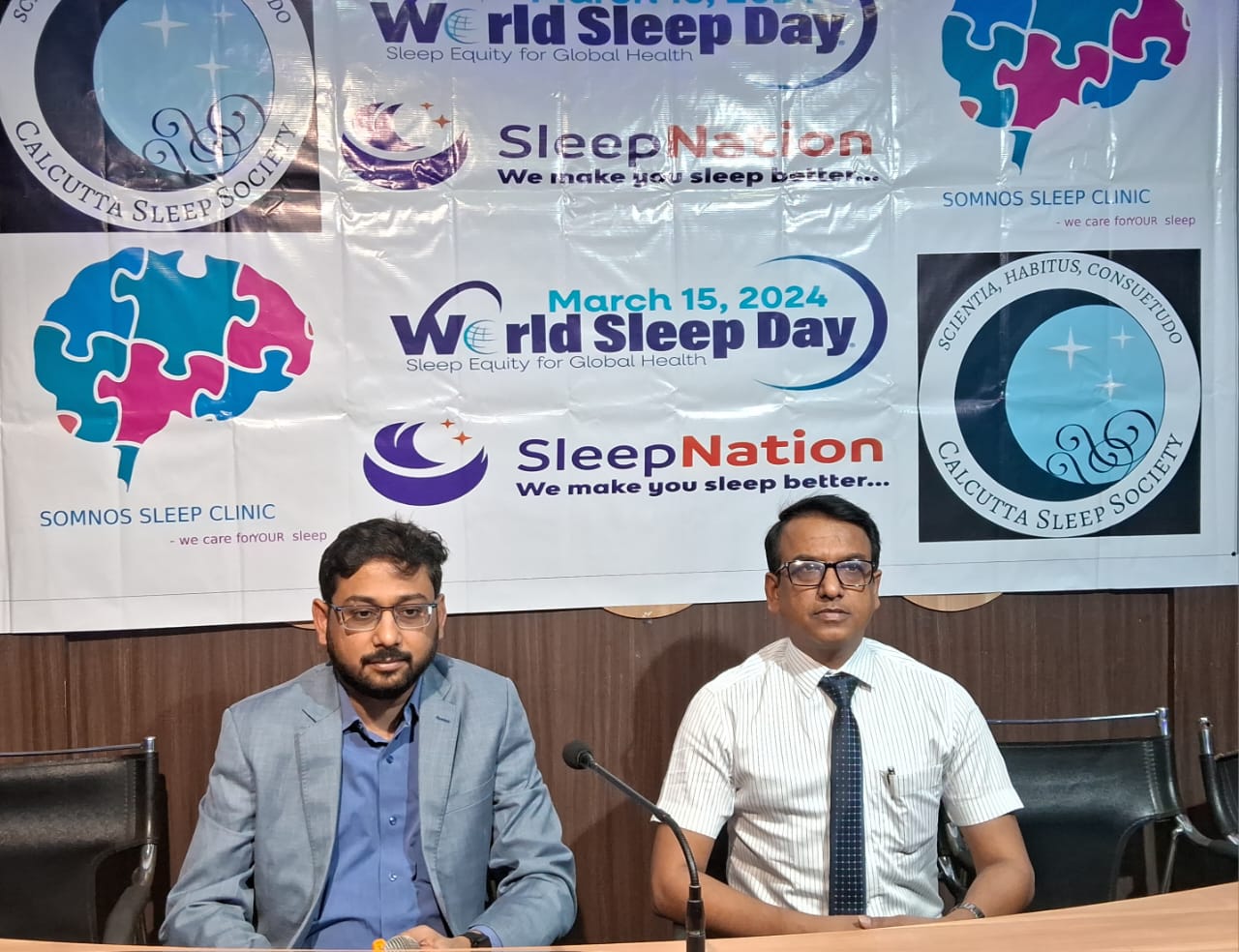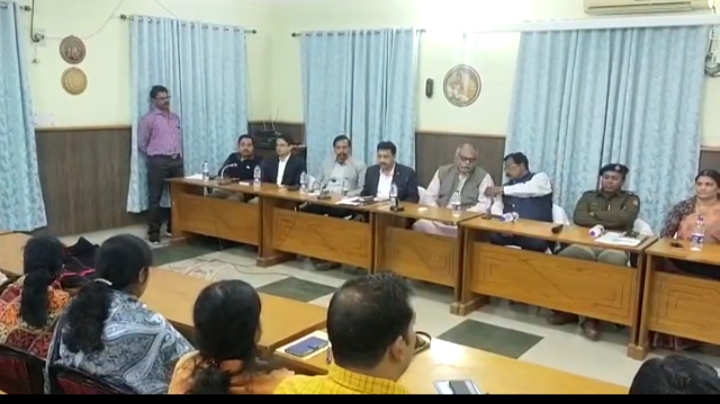Advocating for Equity in Sleep: Transforming Health and Well-being
Kolkata, 9 March 2024: In the tapestry of India’s rich diversity, the need for sleep equity emerges as a critical pillar in the pursuit of collective health and wellness. Sleep, often overlooked amidst the hustle and bustle of daily life, serves as a cornerstone of vitality, impacting every facet of human existence. However, entrenched disparities are rooted in socioeconomic factors, geographical variations, and cultural norms perpetuate inequalities in accessing restorative sleep across the nation. Commemorating the World Sleep Day 2024, World Sleep Society in association with Calcutta Sleep Society organized a special session in Kolkata. Aligning the discussion with this year’s theme ‘Sleep Equity for Global Health. The aim of the event was to issue a global call to action around sleep health awareness. Reiterating and discussing this message, the event in Kolkata was preceded by Dr. Sourav Das, Somnos Sleep Clinic & Medica Super Specialty Hospital, Regional Coordinator for World Sleep Day, World Sleep Society and Secretary, Calcutta Sleep Society; and Dr. Uttam Agarwal, Sleep Apnea & ENT Surgeon, Orange Sleep Apnea Clinic & Belle Vue Clinic along with President, Calcutta Sleep Society.
Recent studies conducted within the Indian landscape shed light on the profound implications of sleep disparities. Research by the Indian Council of Medical Research (ICMR) reveals a complex tapestry of sleep patterns, with rural communities facing distinct challenges in achieving optimal sleep compared to their urban counterparts. Moreover, socioeconomic divides exacerbate the issue, with individuals from marginalized communities, bearing a disproportionate burden of sleep-related health concerns. The physiological pattern of the sleep-wake cycle is influenced by external synchronizing agents such as light and social patterns, creating variations in each individual’s preferred active and sleep periods. Because of the demands. of a 24-hrs working society, it may be imperative for many people to adapt their sleep patterns (physiologically) to their daily activities. Therefore, analyzing the difference in sleep patterns and chronobiological parameters between an essentially rural farming and urban small-town populations. The study was done over 5942 people (women, 67.1%, N 3985; mean age, 44.3 ± 13.1 years), and the result showed compared with the urban population (N = 3427, 57.7%), the rural population (N=2515, 42.3%) presented a more predominantly early sleep pattern, as determined by the mid-sleep phase (rural: 2.26 ±1.16; urban: 3.15 ± 1.55; t-test, p<0.001). The research also indicated less social jetlag (rural: 0.32; urban: 0.55; Mann-Whitney U test, p< 0.001) and the rural population presented a higher prevalence of psychiatric disorders (rural: 156, 6.20%; urban: 165, 4.80%; Chi-square, p<0.05), and a lower prevalence of metabolic diseases (rural: 143, 5.70%; urban: 225, 6.60%;
Chi-square, p<0.05).
Dr. Sourav Das, a renowned sleep specialist based in Kolkata & Secretary, Calcutta Sleep Society, emphasizes the urgency of addressing sleep equity:
“Sleep deprivation isn’t just a personal inconvenience; it’s a systemic issue with far-reaching consequences for public health. It’s imperative that we prioritize equitable access to quality sleep for all individuals across India.”
Dr. Uttam Agarwal, a leading Sleep Apnea surgeon & President, Calcutta Sleep Society, echoes the sentiment, stating, “sleep disorders like sleep apnea pose significant risks to health and well-being. Addressing sleep equity is not just about ensuring adequate rest, it’s about safeguarding the health of our communities.
The ramifications of sleep disparities extend beyond physical health, permeating into cognitive function, mental well-being, and overall quality of life. Research published in the Indian Journal of Medical Research. underscores the intricate link between inadequate sleep and heightened risks of chronic diseases such as obesity, diabetes, and cardiovascular ailments among Indian populations. Effecting change in sleep equity demands a multifaceted approach, weaving together individual empowerment and systemic reform. From grassroots community initiatives fostering sleep education to policy interventions promoting flexible work arrangements, collaborative efforts hold the key to unlocking a future where every Indian enjoys the restorative benefits of sleep.
As India charts its course towards holistic health and well-being, the pursuit of sleep equity must remain central to the national agenda. By recognizing sleep. as a fundamental right and dismantling the barriers that impede access, we pave the path towards a brighter, more equitable future for all. Let’s unite in championing sleep equity as a cornerstone of collective health and prosperity across India.
- Prostate Cancer: A study published in the International Journal of Cancer found that men who reported sleeping less than six hours per night had a 60% higher risk of developing advanced prostate cancer compared to those who slept more than seven hours per night. (Reference: Markt SC, et al. (2015). “Sleep duration and disruption and prostate cancer risk: a 23-year prospective study.” International Journal of Cancer, 137(1), 204-211. DOI: [DOI number])
- Lung Cancer. Research published in the American Journal of Epidemiology suggested that individuals who reported sleeping less than six hours per night had a 55% higher risk of developing lung cancer compared to those who slept more than seven hours per night. (Reference. Cao Y, et al. (2019). “Sleep duration and risk.
of lung cancer incidence in a large cohort study.” American Journal of
Epidemiology, 188(4), 767-776. DOI: [DOI number])
- Pancreatic Cancer: A meta-analysis published in the Journal of the National Cancer Institute indicated that short sleep duration was associated with a 40% increased risk of developing pancreatic cancer. (Reference: Zhang Q, et al. (2015). “Sleep duration and risk of cancer: a systematic review and meta-
analysis of prospective studies.” Journal of the National Cancer Institute




